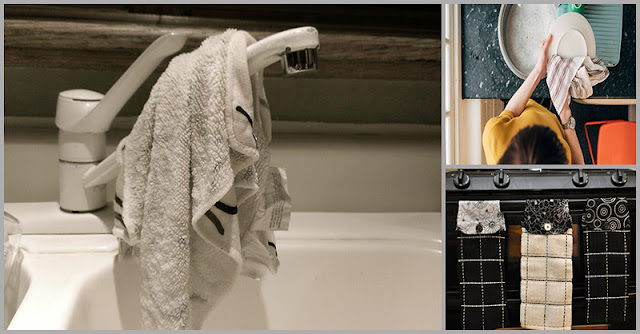Though kitchen towels may seem harmless, a study suggests that they may be housing pathogens that could possibly cause food poisoning.
According to the findings of the study, there are factors that may impact as well as promote the growth of pathogenic microbes on kitchen towels which are responsible for food poisoning. To name a few, these factors include the type of diet, hygienic practices, and family size and composition.
A total of 100 kitchen towels after one month of use were collected by researchers from the University of Mauritius. They identified the residing bacteria by standard biochemical tests and found that 49 kitchen towels to be positive for bacterial growth and out of these samples, 14.3 percent grew Staphylococcus aureus, 36.7 percent grew coliform bacteria, and 36.7 percent grew multiple species of Enterococcus.
Furthermore, researchers also determined that coliforms (E. coli) significantly multiplied in humid towels that were used multiple times and with multipurpose usage such as wiping utensils, holding hot utensils, drying hands, and wiping/cleaning surfaces by families on non-vegetarian diets. It was also detected that S. aureus was at a higher rate from families with children, and those of lower socio-economic status.
In significantly high numbers from families with non-vegetarian diets, both coliforms and S. aureus were isolated. In particular, E. coli is a common bacterium found in the human gut, which is passed through feces and its presence indicated poor hygiene and possible fecal contamination.
The study leader Dr. Susheela D. Biranjia-Hurdoyal said that:
“The data indicated that unhygienic practices while handling non-vegetarian food could be common in the kitchen.”
Included in the highlights of the study are the possible role of kitchen towels in cross-contamination in the kitchen, and other factors that affect the growth of microbes like multiple usage and moisture.
Biranjia-Hurdoyal further added that:
“Humid towels and multipurpose usage of kitchen towels should be discouraged. Bigger families with children and elderly members should be especially vigilant to hygiene in the kitchen.”
The study was presented at ASM Microbe, the annual meeting of the American Society for Microbiology, held from June 7 to June 11 in Atlanta, Georgia.
How To Prevent Food Poisoning?
One of several things that you should follow to avoid food poisoning is to observe proper hygiene in the kitchen. Here are some of the tips that might help you reduce the risk of contracting a foodborne illness.
Wash Your Hands
Washing hands is always a top priority when we hear the word “hygiene.” Wash your hands with soap and water before AND after handling any kind of raw food, including vegetables, meat, fish, and eggs; after blowing your nose; after touching trash bins; after going to the toilet; and after touching animals, even your own pets.
Wash Kitchen Towels Regularly
Damp, used kitchen towels, dishcloths, and the like are the perfect place for pathogenic bacteria to proliferate. Always wash them thoroughly and see to it they are completely dry before using them again.
Wash Your Worktop
Always wash worktops with soapy water before and after preparing food, particularly if raw meat (including poultry), raw fish, raw eggs, and vegetables have been prepared on them.
Cook Food Properly
Make sure raw meats and poultry are cooked thoroughly, with no pink meat inside.
Keep Raw Meat Separate
Make it a habit of keeping raw meat away from ready-to-eat foods like fruits, salad, and bread, since these foods don’t need to be cooked before consumption, and any bacteria that manage to get onto them will stay there.
If you observe proper kitchen hygiene, food poisoning is a preventable health concern.









